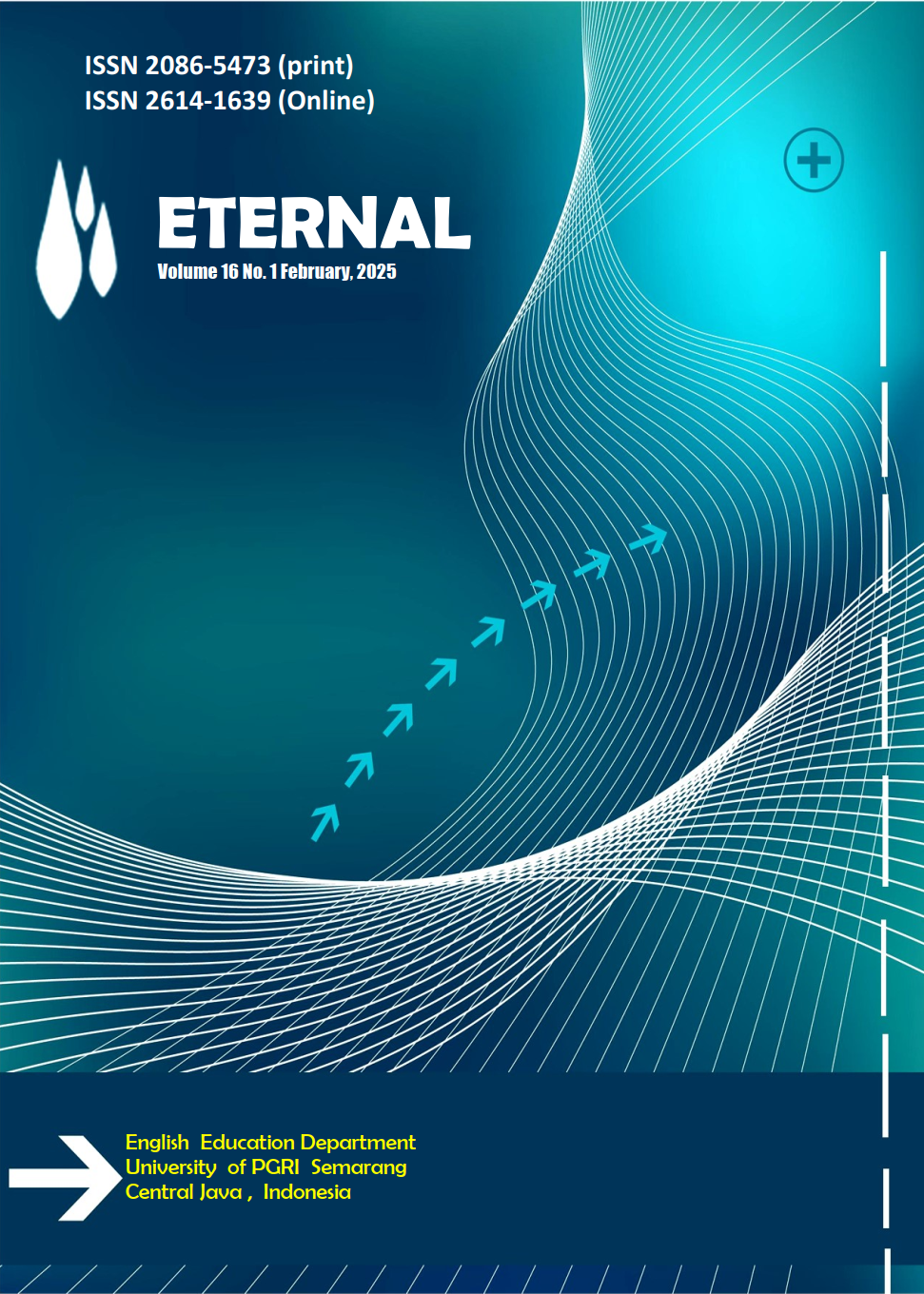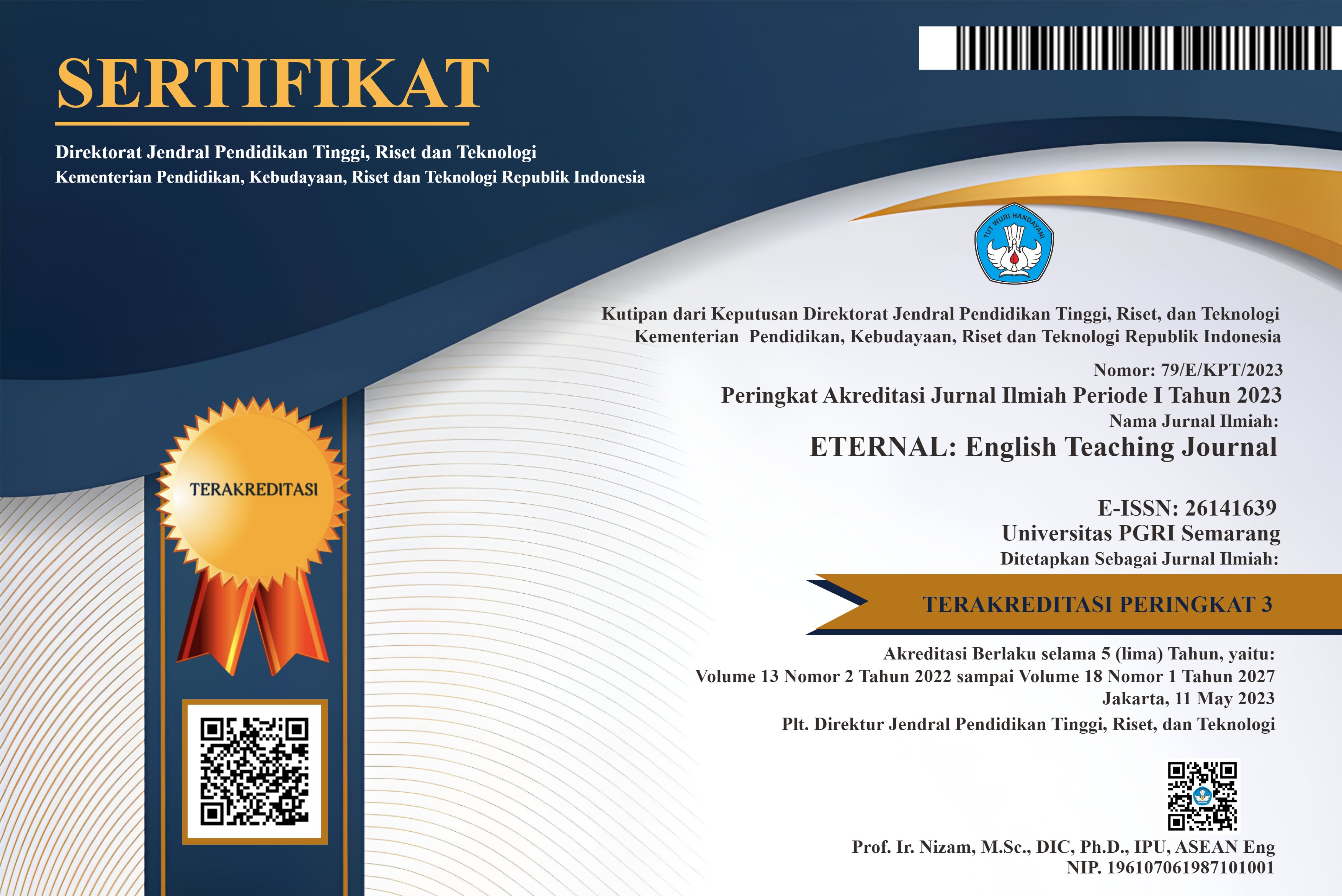Beyond the Score: A Personal Journey of Language Learning and Identity in IELTS Preparation
DOI:
https://doi.org/10.26877/eternal.v16i2.1569Keywords:
IELTS preparation, Self-regulated learning, Identity formation, AutoethnographyAbstract
This autoethnography study examines the author's experiences in language learning and identity formation as related to IELTS preparation. As an English teacher, the author faces the unexpected distance between teaching skill and ability in the usage of language and emphasizes the layered nature of linguistic proficiency. Through a critical examination of her own IELTS learning experience, the author reveals the emotional and psychological struggles of navigating standardized testing, including feelings of overwhelm and inadequacy. Through familiarity with IELTS materials and with taking the IELTS test, the author undertakes a self-revelatory adventure, in which a discourse between language learning, identity, and academic expectation emerges. This reflective narrative presents a complex explanation of the personal psycho-social process behind language acquisition and therefore, the reader is led beyond the score to a set of complex interactions of personal development, self-perception, and identity an academic sense. The findings emphasize the importance of self-regulated learning, social engagement, and cognitive strategies in shaping one's academic and linguistic identity.
References
Adams, T., & Manning, J. (2015). Autoethnography and Family Research. Journal of Family Theory & Review, 7(4), 350–366. https://doi.org/10.1111/jftr.12116
Akehurst, G., & Scott, S. (2021). Out of the Blue and Into It: Autoethnography, Emotions and Complicated Grief. Qualitative Research, 23(2), 434–450. https://doi.org/10.1177/14687941211033456
Ali, M. M., Khizar, N. U., Yaqub, H., Afzaal, J., & Shahid, A. (2020). Investigating speaking skills problems of Pakistani learners in ESL context. International Journal of Applied Linguistics and English Literature, 9(4), 62. https://doi.org/10.7575/aiac.ijalel.v.9n.4p.62
Ali, M. M., Mahmood, M. A., Anwar, M. N., Khan, L., & Hussain, A. (2019). Pakistani learners’ perceptions regarding mobile assisted language learning in esl classroom. International Journal of English Linguistics, 9(4), 386. https://doi.org/10.5539/ijel.v9n4p386
Byczkowska-Owczarek, D. (2014). Researcher’s Personal Experiences as a Method of Embodiment Research. Hexis Theory Society & Culture, 1(1), 11. https://doi.org/10.15584/hexis.3
Chang, H. (2016). Autoethnography as Method. Routledge. https://doi.org/10.4324/9781315433370
Conboy, B. T., Brooks, R., Meltzoff, A. N., & Kuhl, P. K. (2015). Social interaction in infants’ learning of second-language phonetics: an exploration of brain–behavior relations. Developmental Neuropsychology, 40(4), 216-229.
https://doi.org/10.1080/87565641.2015.1014487
Damanik, J. Y. (2022). Language learning strategies used by Indonesian learners in IELTS. Studies in English Language and Education, 9(1), 62-77. https://doi.org/10.24815/siele.v9i1.21448
Damayanti, I. L., Hamied, F. A., Kartika-Ningsih, H., & Dharma, N. S. (2023). Building Knowledge About Language for Teaching IELTS Writing Tasks: A Genre-Based Approach. Studies in English Language and Education, 10(2), 756–776. https://doi.org/10.24815/siele.v10i2.26957
Elgamal, A. M. A. (2019). Cognitive factors affecting language learning and acquisition of native and non-native speakers. Journal of Research in Curriculum Instruction and Educational Technology, 4(4), 135-152. https://doi.org/10.21608/jrciet.2019.31960
Ellis, C. (2004). The ethnographic I: A methodological novel about autoethnography. AltaMira Press.
Fonseca, J., Carvalho, C., Conboy, J., Valente, M. O., Gama, A. P. M., Salema, M. H., & Fiúza, E. (2015). Changing Teachers’ Feedback Practices: A Workshop Challenge. Australian Journal of Teacher Education, 40(40). https://doi.org/10.14221/ajte.2015v40n8.4
Gonzales, A. L., & Hancock, J. T. (2008). Identity Shift in Computer-Mediated Environments. Media Psychology, 11(2), 167–185. https://doi.org/10.1080/15213260802023433
Hou, Y. (2015). An investigation of social factors in children’s foreign language learning—a case study of Taiwanese elementary school students. Open Journal of Modern Linguistics, 05(02), 105-119. https://doi.org/10.4236/ojml.2015.52010
Izzah, L., & Keeya, K. (2019). Common listening challenges: Indonesian EFL learners’ perception. English Language in Focus (ELIF), 1(2), 95–106. https://doi.org/10.24853/elif.1.2.95-106
Keleş, U. (2022). Autoethnography as a Recent Methodology in Applied Linguistics: A Methodological Review. The Qualitative Report. https://doi.org/10.46743/2160-3715/2022.5131
Khabir, M., Jabbari, A. A., Fazilatfar, A. M., & Razmi, M. H. (2022). Flipped presentation of IELTS reading: Impacts on grit, autonomy, and reading achievement in an EFL context. Computer-Assisted Language Learning Electronic Journal, 23(2).
https://callej.org/index.php/journal/article/view/402
Krashen, S. (2000). What Does It Take To Acquire Language? ESL Magazine, 3(3) 22-23. Retrieved from http://www.sdkrashen.com/articles/what_does_it_take/index.html
Lamb, M. (2012). A self-system perspective on young adolescents’ motivation to learn English in urban and rural settings. Language Learning, 62(4), 997-1023. https://doi.org/10.1111/j.1467-9922.2012.00719.x
Lee, J., Hunter, J., & Franken, M. (2017). Negotiating identity: an Asian migrant language learner imagining the future. The Journal of AsiaTEFL, 14(2), 262-276. https://doi.org/10.18823/asiatefl.2017.14.2.4.262
Malinverni, L., & Parés, N. (2016). An autoethnographic approach to guide situated ethical decisions in participatory design with teenagers. Interacting With Computers.
https://doi.org/10.1093/iwc/iww031
Maurer, T. J., & London, M. (2015). From Individual Contributor to Leader: A Role Identity Shift Framework for Leader Development Within Innovative Organizations. Journal of Management, 44(4), 1426–1452. https://doi.org/10.1177/0149206315614372
Mehdiyev, E. (2020). Opinions of EFL Students Regarding Autonomous Learning in Language Teaching. Journal of Language and Linguistic Studies. https://doi.org/10.17263/jlls.759241
Meritan, C. (2021). Exploring the Pronunciation Awareness Continuum Through Self-Reflection in the L2 French Learning Process. Languages, 6(4), 182. https://doi.org/10.3390/languages6040182
Meritan, C., & Mroz, A. P. (2019). Impact of Self‐reflection and Awareness‐raising on Novice French Learners’ Pronunciation. Foreign Language Annals, 52(4), 798–821. https://doi.org/10.1111/flan.12429
Ningrum, R. W., Ningtyas, P. I. A., Hidayati, A. S., & Hamamah. (2021). Developing Syllabus for IELTS Preparation Program. Nobel Journal of Literature and Language Teaching, 12(2), 260–276. https://doi.org/10.15642/nobel.2021.12.2.260-276
Pace, S. (2012). Writing the Self Into Research: Using Grounded Theory Analytic Strategies in Autoethnography. Text, 16(Special 13). https://doi.org/10.52086/001c.31147
Pariyanto, P. and Pradipta, B. (2020). Factors influencing an EFL learner’s proficiency: an english teacher’s perspective. ANAPHORA: Journal of Language, Literary and Cultural Studies, 2(2), 89-97. https://doi.org/10.30996/anaphora.v2i2.3369
Pastor, A. M. R. (2019). Language socialization and clil teachers’ agency in Castilla-la Mancha bilingual programs: appropriations and transformations. Foro De Educación, 17(27), 65-89. https://doi.org/10.14516/fde.702
Pawlak, M. (2015). Motivational dynamics in language learning, zoltán dörnyei, peter d. macintyre and alastair henry publisher: multilingual matters, 2015 isbn: 978-1-78309-255-0 pages: 430. Studies in Second Language Learning and Teaching, 5(4), 707-713. https://doi.org/10.14746/ssllt.2015.5.4.10
Prasetya, R. E. (2023). The Interplay Between Self-Regulated Learning Behavioral Factors and Students’ Performance in English Language Learning Through Moodle. Elt Forum Journal of English Language Teaching, 12(3), 145–156. https://doi.org/10.15294/elt.v12i3.66613
Rahman, A. (2022). Feeling Old on Facebook: An Autoethnographic Analysis of Ageism Among Younger People Towards Their Peers. Sn Social Sciences, 2(11). https://doi.org/10.1007/s43545-022-00549-8
Rahman, F. (2023). Empowering Islamic Boarding School Students With an Introductory IELTS Program. Asian Journal of Community Services, 2(8), 645–652. https://doi.org/10.55927/ajcs.v2i8.5612
Rea-Dickins, P., Kiely, R., & Yu, G. (2007). Student identity, learning and progression: The affective and academic impact of IELTS on ‘successful’ candidates. IELTS Research Reports, 7. British Council & IELTS Australia Pty Limited. https://s3.eu-west-2.amazonaws.com/ielts-web-static/production/Research/student-identity-learning-and-progression-rea-dickins-et-al-2007.pdf
Sabbah, S. S. (2017). The factors that affect qatari college students’ motivation and attitudes to learn English. Mediterranean Journal of Social Sciences, 8(1), 259-269. https://doi.org/10.5901/mjss.2017.v8n1p259
Sabet, M. K., & Babaei, H. R. (2017). On the Relationship Between the IELTS Listening and Listening in Academic English Programs. Advances in Language and Literary Studies, 8(2), 170. https://doi.org/10.7575/aiac.alls.v.8n.2p.170
Santi, V. N., & Bachtiar, R. (2023). From individual to social identity: Shifting in women travelers’ blogs during the COVID-19 pandemic. In Proceedings of the 4th Annual International Conference on Language, Literature and Media (AICOLLIM 2022) (pp. 303–314). Atlantis Press. https://doi.org/10.2991/978-2-38476-002-2_28
Seetharaman, R. (2023). IELTS Band 8 Strategies for Busy Physicians From Non-Native English-Speaking Countries. Cureus. https://doi.org/10.7759/cureus.36838
Shalka, T. R. (2019). The Implications for Asking: An Autoethnographic Exploration of Researching College Student Trauma. Jsaiii, 5. https://doi.org/10.18060/27915
System, N. J. (2023). ASR, Volume 26, N° 1, 2022—Full Issue. African Sociological Review / Revue Africaine De Sociologie, 26(1). https://doi.org/10.57054/asr.v26i1.3997
Tanti, C., Stukas, A. A., Halloran, M. J., & Foddy, M. (2010). Social Identity Change: Shifts in Social Identity During Adolescence. Journal of Adolescence, 34(3), 555–567. https://doi.org/10.1016/j.adolescence.2010.05.012
Tawfiq, H. H. (2020). Investigating the sociocultural factors that affect learning a second language (on the example of English). International Journal of Linguistics, 12(4), 81. https://doi.org/10.5296/ijl.v12i4.17280
Trofimovich, P., Turuševa, L., & Gatbonton, E. (2013). Group membership and identity issues in second language learning. Language Teaching, 46(4), 563-567. https://doi.org/10.1017/s026144481300030x
You, Z. (2023). Exploring Internet Buzzwords in Social Media: An Autoethnography as a Bilingual and Female Internet User. Journal of Education Humanities and Social Sciences, 18, 179–182. https://doi.org/10.54097/ehss.v18i.10975
Yu, R. (2020). On fostering learner autonomy in learning English. Theory and Practice in Language Studies, 10(11), 1414–1419. https://doi.org/10.17507/tpls.1011.09
Zafar, S. and Meenakshi, K. (2012). Individual learner differences and second language acquisition: a review. Journal of Language Teaching and Research, 3(4). https://doi.org/10.4304/jltr.3.4.639-646
Zimmerman, B. J. (2008). Investigating Self-Regulation and Motivation: Historical Background, Methodological Developments, and Future Prospects. American Educational Research Journal, 45(1), 166–183. https://doi.org/10.3102/0002831207312909







